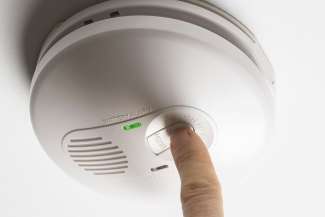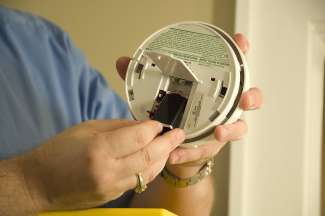Jump To:
In an emergency please dial 911
If your carbon monoxide alarm is sounding, evacuate premises, contact 911, and request an air quality check in your home.
Helpful Links
What types of smoke alarms can I buy?
There are many brands of smoke alarms on the market, but they fall under two basic types: ionization and photoelectric. Regardless of which type you purchase, be sure that it is UL listed. Please check for recalls and reviews on your smoke alarm.
Ionization and photoelectric smoke alarms detect different types of fires. Since no one can predict what type of fire might start in their home, the USFA recommends that every home and place where people sleep have:
- Both ionization AND photoelectric smoke alarms, or:
- Dual sensor smoke alarms, which contain both ionization and photoelectric smoke sensors.
- Choose interconnected smoke alarms, so when one sounds, they all sound.
- There are also alarms for people with hearing loss. These alarms may have strobe lights that flash and/or vibrate to alert those who are unable to hear standard smoke alarms.
How do I take care of my smoke alarm?
Is your smoke alarm still working? A smoke alarm with a dead or missing battery is the same as having no smoke alarm at all. A smoke alarm only works when it is properly installed and regularly tested. Take care of your smoke alarms according to the manufacturer’s instructions. Below are some general maintenance tips.
Smoke alarm powered by a nine-volt battery
- Test the alarm monthly.
- Replace the batteries at least once every year.
- Replace the entire smoke alarm every 10 years.
Smoke alarm powered by a 10-year lithium (or “long-life”) battery
- Test the alarm monthly.
- Since you cannot (and should not) replace the lithium battery, replace the entire smoke alarm according to the manufacturer's instructions.
Smoke alarm that is hardwired into your home's electrical system
- Test the alarm monthly.
- Replace the backup battery at least once every year.
- Replace the entire smoke alarm every 10 years.
Where do I put smoke alarms in my home?
A closed door may slow the spread of smoke, heat and fire. Put smoke alarms inside and outside each bedroom and sleeping area. Put alarms on every level of the home. Smoke alarms should be interconnected. When one sounds, they all sound.
Place smoke alarms on the ceiling or high on the wall. Check the manufacturer's instructions for the best place for your alarm.
Only qualified electricians should install hardwired smoke alarms.
What do I do if my smoke alarm sounds while I'm cooking?
Never take the battery out of your smoke alarm while cooking! If a smoke alarm sounds while you're cooking or taking a shower with lots of steam, do not remove the battery. You should:
- Open a window or door and press the “hush” button.
- Wave a towel at the alarm to clear the air.
- Move the entire alarm several feet away from the kitchen or bathroom.
- Disabling a smoke alarm or removing the battery can be a deadly mistake.
Are smoke alarms expensive?
Smoke alarms are not expensive and are worth the lives they can help save.
- Ionization and photoelectric: $6 and up
- Dual sensor: $24 and up
- Smoke alarms with a microprocessor (faster to alert, fewer false alarms): $30 and up
- Radio frequency/wireless (communicate from one to the next without wires): $40 and up
What powers a smoke alarm?
Smoke alarms are powered by battery or by your home's electrical system. If the smoke alarm is powered by battery, it runs on either a disposable nine-volt battery or a non-replaceable 10-year lithium (“long-life”) battery. Alarms that get power from your home's electrical system, or “hardwired,” usually have a back-up battery that will need to be replaced once a year.

